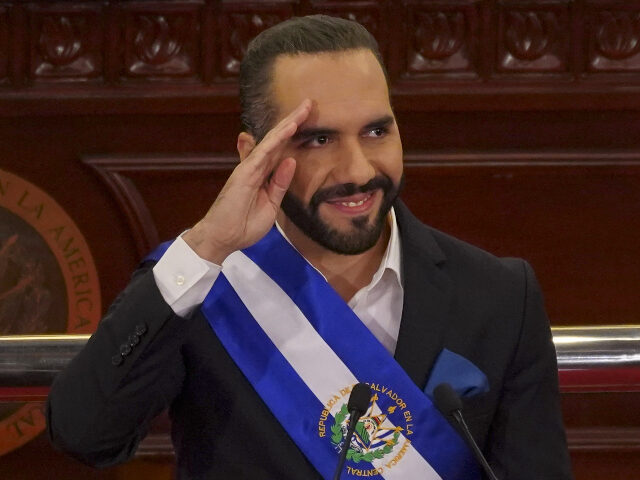El Salvador’s 2024 presidential election campaign officially began on Tuesday, with incumbent President Nayib Bukele poised to be reelected by an ample margin despite the nation’s constitution explicitly forbidding him from running.
The election, slated for February 4, 2024, will see more than six million Salvadoran voters head to the polls and cast their votes to elect the country’s next president, vice president, and all 60 members of the Salvadoran Congress for the next five years.
Dora Esmeralda Martínez, head of El Salvador’s Supreme Electoral Tribunal (TSE), informed the public Tuesday that the four-month campaign will end three days before the election. Prospective candidates have until October 26 to formalize their respective candidacies at the nation’s top electoral authority.
The four-month campaign that began on Tuesday will see seven political parties compete for the presidency and legislative seats. President Nayib Bukele and current Vice President Félix Ulloa, who have not yet registered their candidacies with the TSE at press time, are expected to be reelected for a five-year term in the upcoming election despite several articles of El Salvador’s constitution containing explicit prohibitions that forbid a president from being reelected.
Bukele, who was confirmed as the ruling New Ideas (NI) party’s candidate in June, sees his pathway towards a new presidential term fundamentally based on a controversial interpretation of the Salvadoran constitution’s Article 152 issued by the nation’s Supreme Court of Justice — whose top justices were replaced by the pro-Bukele majority in Congress in 2021.
In September 2021, the top court determined that a sitting president is able to run for a second consecutive five-year term so long as they resign six months before the end of their current term. As such, Bukele is expected to resign from the presidency no later than November 30 to comply with the court’s requirements and participate in the upcoming election.
The New Ideas party kicked off its electoral campaign on Tuesday by publishing a poster on Twitter calling for the election of Bukele.
MARCA LA N DE NUEVAS IDEAS
VOTA POR @nayibbukele.¡VAMOS POR TODO! 🇸🇻 pic.twitter.com/IarbHmxCce
— Nuevas Ideas (@nuevasideas) October 3, 2023
Bukele replaced the adoption of the Bitcoin cryptocurrency with a crackdown on El Salvador’s once out-of-control gang violence as his main campaign issue. The crackdown, possible through a “state of exception” emergency decree that has kept El Salvador in a de-facto state of martial law since March 2022, has dramatically reduced crime in the country. The changes have allowed Bukele to continue to enjoy overwhelmingly high approval ratings, making him one of the most popular presidents not just in El Salvador but in the region as a whole.
Law and Order: El Salvador Builds “Mega Prison” to Eradicate Gangs
Bukele’s crackdown on gang violence has inspired regional authorities such as Colombia and Peru to implement their own versions of the “Bukele Plan” to reduce violent crime in their municipalities.
Polls released at the end of August showed that Bukele had the support of 68.4 percent of voters, with his closest rival barely hovering over four percent.
On Sunday, the leftist Farabundo Marti National Liberation Front (FMLN) party — which Bukele was once expelled from — announced that Juan Manuel de Jesús Flores will run as its presidential candidate. During the announcement, Flores mentioned that he will present his campaign proposal over the next few days, taking the economy, security, migration, human rights, and the environment as the main topics of his proposal.
“I ask Salvadorans to give me their trust, their vote to transform this country and make it more competitive,” Flores said during the event.
Bukele was a member of the FMLN party until he was expelled in 2017 for “violating” party principles.
Other parties, such as the center-right Nationalist Republican Alliance (ARENA), the center-left Our Time (NT), the right-wing Solidarity Force (FS) and Salvadoran Patriotic Fraternity parties, and the centrist Salvadoran Independent Party have until October 26 to present their respective candidates.
A second election will take place on March 3. In it, the Salvadoran electorate will choose the country’s new deputies for the Central American Parliament (PARLACEN), a regional parliamentary body founded in 1991 and tasked with furthering human rights and international law. Despite being trusted with protecting human rights, PARLACEN is currently led by a representative of Nicaragua’s communist Sandinista regime, a notorious human rights violator.
Christian K. Caruzo is a Venezuelan writer and documents life under socialism. You can follow him on Twitter here.

COMMENTS
Please let us know if you're having issues with commenting.